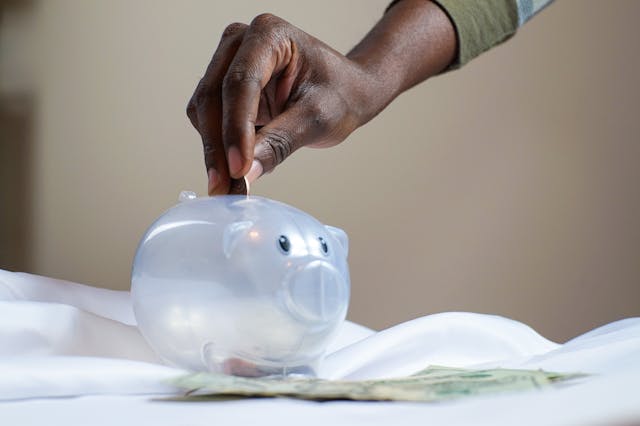An independent member of the Islamic Relief family of organizations, Islamic Relief USA (IRUSA) takes pride in uplifting communities in need around the world. Through the Poverty to Profit microfinance program, IRUSA and Islamic Relief help independent entrepreneurs in developing nations secure small, interest-free loans to help grow their small businesses.
Poverty to Profit has improved the lives of countless business owners and is funded by donations from IRUSA supporters. Let’s explore how Poverty to Profit works, some success stories from beneficiaries, and how donating to the program can change lives.
What is microfinance?
Microfinance is a financial service that provides small loans, savings accounts, and insurance to entrepreneurs and small businesses in underserved communities, many of whom lack access to traditional banking and credit. Islamic Relief employs this approach to alleviate poverty and empower individuals to become more self-sufficient.
Startup capital is often inaccessible to low-income individuals because lenders and traditional financial institutions typically consider loans to these people uneconomical. The World Bank’s Global Findex estimates that 1.7 billion adults worldwide lack access to formal credit or savings.
Microfinance operates on the principles of financial inclusion, social empowerment, and sustainability. Islamic Relief’s microfinance program primarily works with vulnerable populations, including women, refugees, and marginalized communities who lack access to traditional banking services. By offering financial support, the program aims to uplift individuals and families out of poverty while building more resilient and economically developed communities.
Microfinance in Islam
The Poverty to Profit program adheres to Islamic finance principles, which prohibit interest-based transactions and promote ethical financial practices.
Qard al-hasan
The Poverty to Profit program strictly adheres to the Islamic principle of Qard al-hasan, or benevolent lending for welfare purposes. In Islam, all loans are interest-free, meaning the borrower must only repay the amount borrowed. This principle encourages Muslims to help the poor and needy through loans without interest, which the Quran states is a noble act.
Murabaha
Murabaha is a prevalent Islamic financial arrangement where a buyer and seller agree on a markup or profit margin for the goods sold. This method allows buyers to pay over time while adhering to Islamic principles by avoiding interest payments. It has become a common practice in Islamic finance and is used in various financial products, such as investment funds and Islamic bonds, to ensure compliance with Islamic principles regarding financial transactions.
Mudaraba
Mudaraba is an Islamic finance partnership structure. One party, known as the rabb-ul-mal or silent partner, provides capital, while another, the mudarib or working partner, contributes labor. Profits resulting from the venture are divided based on a pre-determined ratio, typically agreed upon before the venture begins. This arrangement fosters a balanced distribution of risk and reward by emphasizing the shared responsibility between capital and labor.
In Islamic finance, mudaraba allows entrepreneurs to access financing while sharing both profits and risks with financial institutions. This participatory model aligns with Islamic principles, as neither party bears the full burden of failure.
How does the Poverty to Profit Program work?
Islamic Relief’s Poverty to Profit program consists of the following five steps:
- Entrepreneurs in developing nations apply for microfinance loans for their businesses.
- Islamic Relief collects donations and distributes them to accepted applicants.
- The entrepreneur uses their loan funds to help their business grow.
- After some growth, the entrepreneur repays their loan.
- Islamic Relief loans these funds to another entrepreneur.
This cycle repeats itself, which allows for loans to multiple entrepreneurs.
As much as 99% of the credit is typically recovered, which allows the money to be recycled and loaned out again.
Poverty to Profit success stories
The program has helped lift countless entrepreneurs and small business owners out of poverty. Here are a few of the most inspiring success stories.
Abdul Waheed
Abdul Waheed of Pakistan owns a food cart, selling vegetables to passersby along a street. Abdul is disabled and requires crutches to walk, which makes it impossible to move his cart. However, he can always rely on the kindness of a neighbor to help him set out his cart.
Abdul received a Qard al-hasan loan from Islamic Relief, which he used for his street cart business. This loan soon resulted in profits that allowed Abdul and his wife to enjoy a higher standard of living, as they purchased a washing machine, refrigerator, television, and fan for their home.
Naureen
Also based in Pakistan, Naureen has been an incredibly talented crochet embroiderer for over 16 years—a skill she acquired from her mother. Naureen’s family was struggling to make ends meet after the death of her father, but she managed to help them overcome these challenges with the help of an interest-free loan from Islamic Relief.
Naureen used her loan to gradually grow her garment business, which would go on to become much more successful. She has sold crocheted garments for up to 700,000 Pakistani rupees (approximately USD $720). While Naureen was the sole embroiderer in the early stages, she now employs several local women, which has allowed her to uplift not just her own family but her community at large.
Support an entrepreneur today
These are just two success stories from the Poverty to Profit program—many other hardworking business owners around the world are benefiting from the Islamic microfinance loans provided by Islamic Relief. If you would like to help, go to povertytoprofit.irusa.org to learn more about the entrepreneurs in the program and donate to their businesses.
